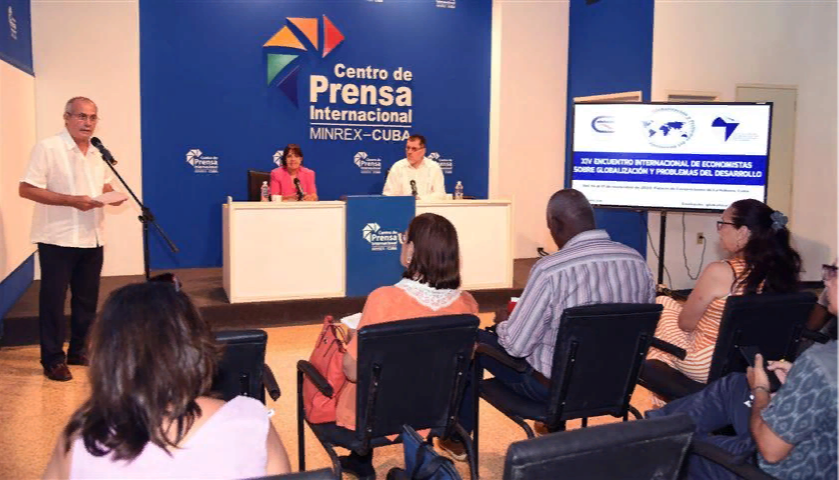The Fourteenth International Meeting of Economists on Globalization and Development Problems will take place at the Havana Convention Center from November 14 to 17, as reported by Oscar Luis Hung Pentón, president of the National Association of Cuban Economists -ANEC.
Organized by ANEC and by the Association of Economists of Latin America and the Caribbean (AELC), the event has as its origins an idea of the Commander in Chief, Fidel Castro. It was carried out annually between 1999 and 2010; and then, in 2015, it took place in Panama with a full deployment of its Academic Committee.
As Hung Pentón explained during a press conference this Thursday, the event will take place in a hybrid format and invites academics, researchers, economic and social science professionals from all schools of thought, to stimulate an enriching debate on current economic issues.
The also protempore president of the AEALC explained that for this opportunity they are designing an event with very contemporary themes: the analysis of the Sustainable Development Goals and the 2030 Agenda, environmental issues, circular economy processes, among others that will arouse greater interest.
Since it was conceived by the Commander, the event has two important characteristics: respecting the criteria of different lines of thought on economic and social sciences and calling for plurality, as well as promoting the scientific rigor of the presentations and final proposals, Hung Pentón added.
For her part, the president of the Academic Committee, Esther Aguilera Morató, commented that given the characteristics of the world situation, the economic crisis has more devastating effects than before: it is linked to complex contemporary problems such as COVID-19, the war in Ukraine and the slowdown in global and regional economic growth.
“This complex situation requires its systematic examination, a diagnosis of the current situation, which is one of the objectives of the event,” argued the Honorary President of the AEALC.
He insisted that this event is one of a kind and provides tools for mobilizing both awareness and action. In this way, it includes among its main themes the international economy in times of crisis, the crisis of multilateralism, the power of communication in an international order in transition and the contradictions and interdependencies between great powers.
It also includes changes and continuities in the globalization process, international trade in goods and services, global value chains, financial architecture, and the dilemmas of social inclusion in times of crisis and cultural mutations.
The members of the Meeting will also discuss business internationalization, new players, entrepreneurship, cooperative companies, integration and the challenges for growth and development, among other issues.
In parallel, the event will have a specific space for young people and students to debate, and a forum for businessmen, to discuss from a theoretical point of view to analyze what else we can do, he concluded.


